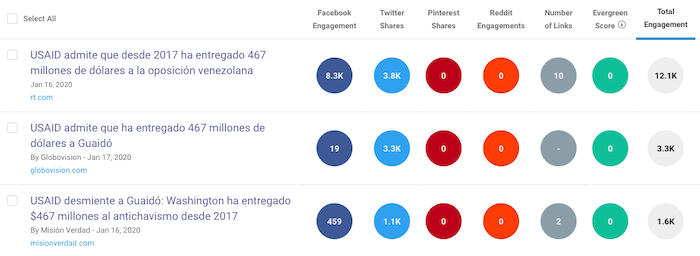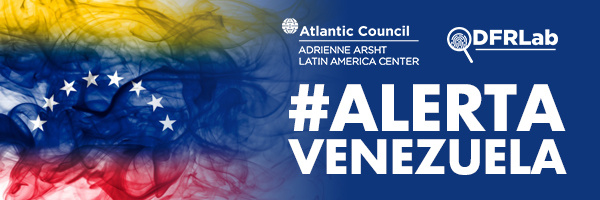#AlertaVenezuela is leading the way in identifying, exposing, and explaining disinformation within the context of one of the Western Hemisphere’s largest crises in recent history, where the fight for control of the information space will continue to pose a challenge for the region.
Top Story
Misleading claim against Venezuela’s Guaidó published in Russian, Iranian, Cuban outlets
Accusations of corruption against Juan Guaidó and other National Assembly members resurfaced in the form of a misleading claim regarding the misappropriation of foreign funds that was pushed by pro-Maduro regime blogs and media outlets from Venezuela and regime-allied countries.
The claim put forth that Guaidó, recognized as Venezuela’s interim president by almost 60 countries, misused $467 million USD in funds received from the United States Agency for International Development (USAID). The claim, which first circulated in 2019, resurfaced on January 14, 2020, when the Brazilian left-wing outlet Diário do Centro do Mundo published an article claiming that accusations of corruption against Guaidó had created tension inside Venezuela’s opposition coalition.
The story evolved to focus on the $467 million delivered by USAID to members of the opposition coalition when it was picked up by the website Misión Verdad (“Truth Mission”), which brands itself as an independent news organization but publishes pro-Maduro content. The content also started to be amplified on social media conversations.
The story gained traction in international outlets when Russia’s state-funded RT en Español (the Spanish version of RT) ran an article on it. The story was also published by the Iranian state-funded HispanTV and Cuba’s state-funded JuventudRebelde, among others.

Talk of the Country
In the media
On January 22, 2020, independent Venezuelan outlet El Diario published an interview, “Pedro Jaimes y la tortura detrás de un tuit” (“Pedro Jaimes and the torture behind a tweet”), with Pedro Jaimes, a Twitter user who spent one year and five months detained in El Helicoide between May 10, 2018, and October 17, 2019. Jaimes told the newspaper about the torture and abuse he suffered during his detention, despite never having been formally charged. According to El Diario, Jaimes had been detained “for having published the flight route of the presidential plane in which Nicolás Maduro moved two days before; despite it being a public information.” The article showed how the Maduro regime uses the state apparatus to control information that is published online, in part by imprisoning journalists. Just five days earlier, one such journalist, Víctor Ugas, was released after being detained in December.
Ábalos admite ahora, tras negarlo, que sí se vio con la número dos de Maduro (“Ábalos admits now, after denying it, that he met Maduro’s number two”), published by Spanish media outlet ABC (unrelated to the U.S.-based outlet of the same name) on January 24, 2020, was one of the articles about Venezuela that garnered the most interactions on social media between January 21 and January 27, according to a BuzzSumo query. The article reached 16,600 shares and 40,700 likes on Facebook. In total, posts referencing the article received 78,900 engagements on Facebook and Twitter combined. In its article, ABC claimed that, according to its sources, José Luis Ábalos, Spain’s minister of transport and one of the directors of the Partido Socialista Obrero Español (“Spanish Socialist Workers Party”), met with Delcy Rodríguez, vice president of the Maduro regime, “in a reserved area [considered international] of the Adolfo Suárez Madrid-Barajas airport.” Ábalos denied that the meeting had happened. Rodríguez is banned from entering several countries as part of European Union sanctions imposed on the Maduro regime. The supposed meeting, if confirmed, would have happened the same week that Guaidó was also in Spain. Spanish Prime Minister Pedro Sanchéz decided not to meet with Guaidó in Madrid, despite Spain and the EU recognizing him as Venezuela’s interim president. According to Spanish newspaper El País, Guaidó’s visit turned into a battle between right and left in Spain.
What’s Trending
On Social Media
#TrumpAyudaMilitarYA
The hashtag #TrumpAyudaMilitarYA (“Trump military assistance NOW”) trended on Twitter on January 23 and January 24. January 23 marked the anniversary celebration of the coup d’état against dictator Marcos Pérez in 1958, as well as the day Juan Guaidó took an oath to be interim president of Venezuela in 2019.
Accounts using this hashtag asked for a military intervention to take down the Maduro regime, tagging political leaders and governments of other countries, including the United States, Brazil, and Colombia. Among the accounts mentioned in the tweets were both the personal and official accounts of Donald Trump, @realDonaldTrump (3,219 mentions) and @POTUS (1,794 mentions). Both accounts were mentioned in 43.8 percent (5,013 mentions) of the total tweets (11,438) using the hashtag.
The account that tweeted the hashtag the most was @EquipoTac (archive) with 415 mentions. @EquipoTac’s profile says that the account is a “[d]river of HTs [Hashtags]. Number one in creating national trends.” @EquipoTac retweeted other accounts, such as @revista_if, @DCiudadanaV, and @delascenizasvzl, which also promoted #TrumpAyudaMilitarYA and which have previously tweeted criticisms of both Guaidó and Maduro. These accounts are aligned with right and libertarian political organizations.

Official Statements
“Armed groups use brutal violence to control peoples’ daily lives in the eastern Colombian province of Arauca and the neighboring Venezuelan state of Apure”. – José Miguel Vivanco, Executive Director, Americas Division, Human Rights Watch, on his Twitter account on January 22.
Vivanco tweeted a link to a new report about the illegal groups on the border of Venezuela and Colombia that “operate with near-to-absolute impunity on both sides of the border, and especially in Venezuela they sometimes are in collusion with security forces and local authorities.” The presence of illegal and legal armed groups in the border has been creating tensions between Maduro and Iván Duque, president of Colombia.
El gobierno de los EE.UU. usa todo su esfuerzo y dinero para hacernos daño. Pero la voluntad del pueblo venezolano es inquebrantable, el imperio no ha podido ni podrá con nosotros. Continuaremos juntos por el camino de la Paz, la igualdad y la independencia absoluta.”
“The U.S. government uses all its effort and money to hurt us. But the will of the Venezuelan people is unwavering, the empire has not been able to, and will not be able to take us down. We will continue together down the path of peace, equality and absolute independence”. – Nicolás Maduro on his Twitter account on January 27. This statement was given by Maduro after several claims against international bans and public accusations regarding the alleged misappropriation of funds discussed in the top story above.
Our Team in the News
Jason Marczak, director of the Adrienne Arsht Latin America Center, was interviewed and quoted in a Sinclair article touching on Guaidó’s interim government’s progress in the past year. The article was republished around the United States.
Marczak was also quoted in a Univision article commenting on the United States’ role in supporting Guaidó.
Diego Area, associate director at the Adrienne Arsht Latin America Center, appeared in TRT World’s Newsmakers, commenting on the Venezuela crisis.
Domingo Sadurni, assistant director at the Adrienne Arsht Latin America Center, spoke to Voice of America regarding the progress of Guaidó’s interim government one year in.
The Adrienne Arsht Latin America Center’s December event on Maduro’s illicit sources of revenue was mentioned in an article on Infobae Argentina, which was subsequently republished by a variety of outlets in Latin America.
Recent Analyses
From the DFRLab: “Misleading claim against Venezuela’s Guiadó spread abroad,” published by the DFRLab, described in more detail the broader implications of the narrative campaign directed at Guaidó regarding allegedly misappropriated USAID funds.
From the Adrienne Arsht Latin America Center: Around the one-year anniversary of Juan Guaidó’s term as interim president of Venezuela, the Center put out a resource guide that included its latest report PeaceGames Venezuela: Pathways to Peace, which had its own featured article in Foreign Policy.
On Thursday, January 23, the Adrienne Arsht Latin America Center hosted a public event on the USAID and IDB JuntosEsMejor Challenge, for which the Latin America Center is an outreach partner.
On Friday, January 17, the Adrienne Arsht Latin America Center hosted a special presentation by Luis Vidal on new poll data out of Venezuela collected by More Consulting. The event, and Luis’ presentation, appeared in ABC Internacional.
Subscribe to the #AlertaVenezuela newsletter
To receive future editions of the #AlertaVenezuela newsletter each week, sign up below!
